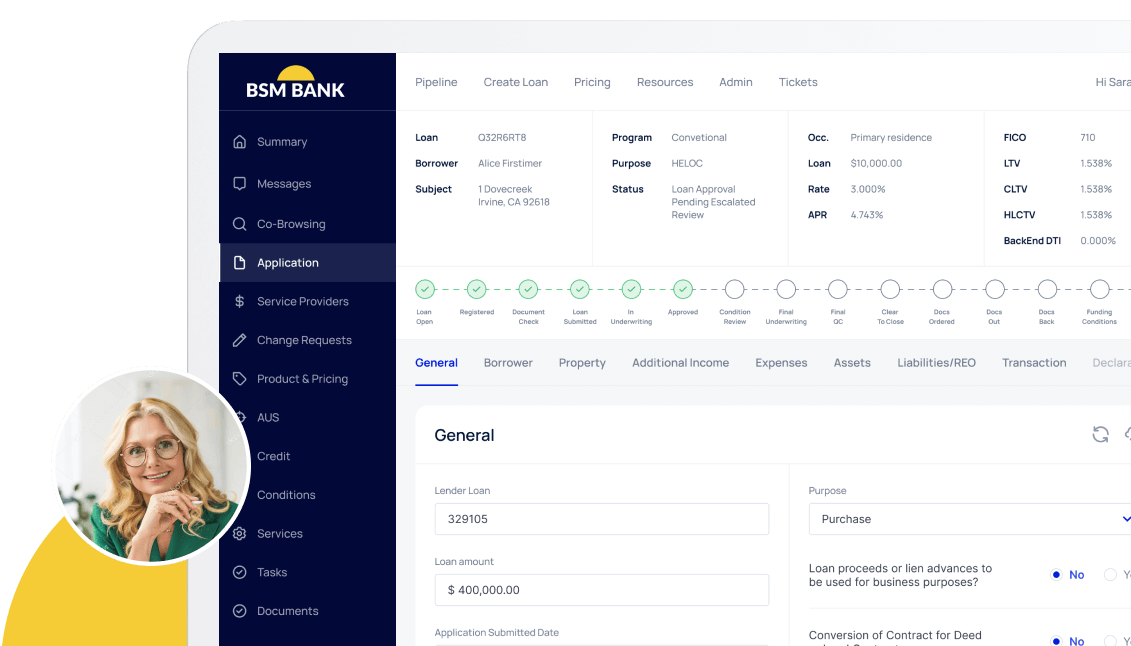We’ve barely scratched the surface when it comes to leveraging the capabilities of artificial technology but it has many loan officers wondering whether they’re at risk of being replaced by digital mortgage technology. Self-checkout kiosks have replaced some retail workers but it doesn’t mean removing loan officers will be so easy.
Loan officers play a vital role in mortgage lending. They’re the borrower’s primary point of contact throughout the mortgage loan process and they’re responsible for making sure the application goes as smoothly as possible from start to finish.
In an interview with HousingWire’s Editor-in-Chief Jacob Gaffney and Movement Mortgage CEO Casey Crawford, when asked about the application of mortgage automation and AI, Crawford stated, “You can’t automate relationships. You can’t automate empathy.” This is why the human loan officer is here to stay.
When Automation Makes Sense
You can compare the mortgage loan process to automotive production lines. Instead of a single person doing the job from start to finish, production lines use a division of labor system. Smaller pieces of the job are completed and come together as one.
In the mortgage loan process, labor is divided and like a puzzle, all of the pieces come together. Each piece of the puzzle is handled by individuals with specialized skills who complete their task and move the application to the next person. This process creates congestion and points of friction that slow down the entire process.
Let’s look at an example of a mortgage loan process bottleneck. Patrick Stone, CEO of Williston Financial Group (WFG), spoke at the National Title Insurance Spark Conference in March of 2015 and he asked, “How often do you think name and address are entered in a typical real estate transaction?” The answer was 80 times. “So if you’re entering it 80 times is there any chance it may be entered wrong once or twice?” and he couldn’t be more right. Repetitive tasks increase the frequency of human error.
These robots, or robotic process automation (RPA), are ruled-based automation tools that can be programmed to gather, index, read, understand, react to and execute mortgage company business processes. These automation processes can interact with the lender’s loan origination platform, legacy systems, and user interfaces similar to how a human would interact with these systems – only faster.
Artificial intelligence and machine learning mimic human intelligence and decision making. Mortgage lenders are leveraging this technology in their loan application process in repetitive, ruled-based tasks to improve productivity, accuracy and customer experience.
Lenders are no longer tied-down and restricted by human capabilities. Financial service industries deal with an endless amount of repetitive tasks and massive amounts of data, documents, applications and compliance directives that need to be handled with accuracy. Automation makes sense when it comes to defined processes and the need for compliance and transparency.
The Role of Loan Officers
The benefits of automation in lending are undeniable but this technology won’t be replacing the loan officer.
Loan officers are mortgage specialists. Mortgage loan officers gather a client’s information such as credit, financial and employment documentation to review for eligibility of a mortgage loan and help the client by coming up with financing options that match the client’s capabilities.
The responsibilities of the mortgage loan officer include:
- Evaluating complex financial information
- Solving any problems that may arise during the application process
- Personalizing and building relationships with clients
These aren’t just repetitive, rule-based tasks. Loan officers are trained to deal with customers and their problems based on their unique needs. Current technology can’t provide the level of critical thinking and personalization required that would outdo a human loan officer. Buying and refinancing aren’t as simple as choosing the items for your combo meal at a fast-food kiosk.
Critical Thinking
Critical thinking is more than just problem-solving. It’s a complex analysis of facts and the ability to think clearly and logically to understand a connection between ideas. Online or app-based mortgage applications are quick and easy but when a borrower has a specialized question that can’t be answered by a chatbot, the loan officer is there to help.
Problems that loan officers face that can’t be automated are “people problems.” These usually involve barriers in communication between employers or agents, or the ability to go above and beyond for a borrower with a specific need or issue. Sometimes, loan officers need to call in support from other departments or pick up the phone because an employer isn’t responding about a verification or they need to get creative for a difficult and unanticipated circumstance the borrower found themselves in.
Subscribe to BeSmartee 's Digital Mortgage Blog to receive:
- Mortgage Industry Insights
- Security & Compliance Updates
- Q&A's Featuring Mortgage & Technology Experts
What if a borrower is past due on a mortgage payment because of an unexpected expense such as a family emergency? This isn’t a rule-based scenario that automation software can answer. What about the mortgage process for a self-employed, sole proprietor, C-corp or other small business owners? Lenders look for consistent and stable income but businesses see ups and downs in revenue during the fiscal year. This information needs to be discussed between a borrower and a loan officer, not an algorithm.
Loan officers bring insight, guidance and critical thinking skills to their clients that cannot be duplicated with technology.
Personalization
While the use of new mortgage technology is on the rise, borrowers still expect a human touch in their experience. After all, who wants to make one of the biggest transactions in their lifetime without some aspect of personalization?
Ellie Mae reported that web self-service was the preferred channel during loan discovery and research but the human element remained critical across the generations. Findings from the 2019 Borrower Insights Survey noted that 25% of people who used an online mortgage application started the application online but didn’t complete it online and almost half of those that used an online application required multiple sessions to complete.
Almost 60% of those who abandoned their online mortgage application did so because it was too long of a process and one out of five who abandoned the application ended up choosing a different lender. Borrowers also claimed that a reason for needing multiple sessions to complete the application was because they needed to gather the information they didn’t realize they needed. This is why mortgage lenders need to follow up with borrowers to provide assistance when necessary.
Another interesting find from this report was that 79% of Millennials reported frequently meeting in person with their lenders, compared to 61% of baby boomers. Younger generations of homebuyers prefer more frequent communication with their lenders across multiple channels.
As the world becomes more digital and the use of AI and machine learning algorithms becomes common practice, communication and personalization are still top priorities amongst borrowers.
Technology Is a Tool for Loan Officer Productivity
Robots are pushing loan officers forward, not taking their jobs. Automation of the mortgage application process gives loan officers freedom from repetitive tasks to focus on the “human” aspect of their job.
Technology and digital solutions in the lending space open the door for lenders to reach a wider range of borrowers through their preferred channels of communication. Tech such as automated engagement technology can’t replace personalization but this gives loan officers the chance to nurture customer relationships through frequent communication and engagement with borrowers. Sales and marketing automation software allow loan officers to automate email marketing, social media marketing and direct mail marketing as well as the ability to track customer journeys plus other lead generation and web analytic tools.
Instead of seeing technology as the competition, loan officers need to see it as a tool to help their customers and to reach their own goals.
Final Thoughts
There’s no doubt that robots are changing the mortgage industry but the loan officer is as important now as ever before. Customers and referrals do business with their loan officers because of the services they provide, which can’t be matched by robots.
The automation of workflows gives loan officers the time and ability to build customer relationships. Not only is technology giving loan officers more time for engagement, but mortgage loans are closing more quickly, opening up opportunities for more business. As long as borrowers continue to value lender interaction and need human intervention for complex problems, loan officers aren’t going anywhere.
Robots in the mortgage industry are here to stay. How are you leveraging technology to get ahead in the mortgage industry?
Learn how lenders use the BeSmartee Mortgage POS as a tool for their loan officers. Call us at (888) 276-1579 or reach out to our mortgage technology experts at sales@besmartee.com today.




